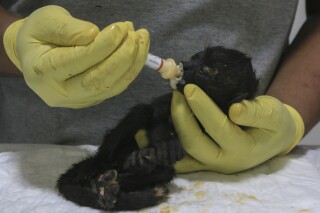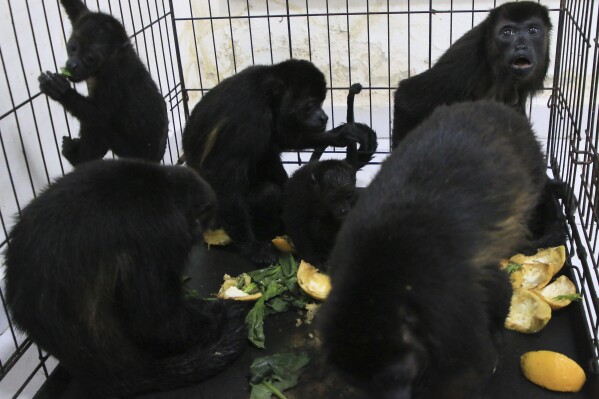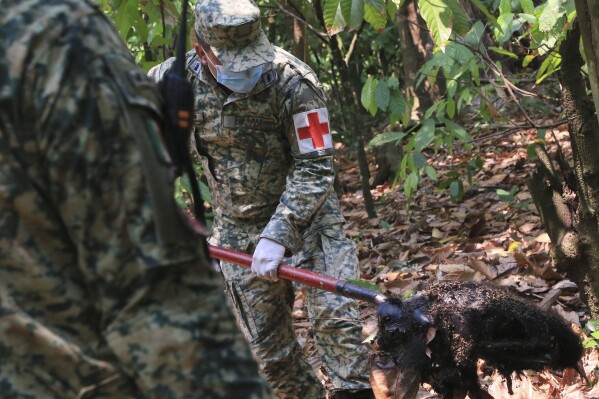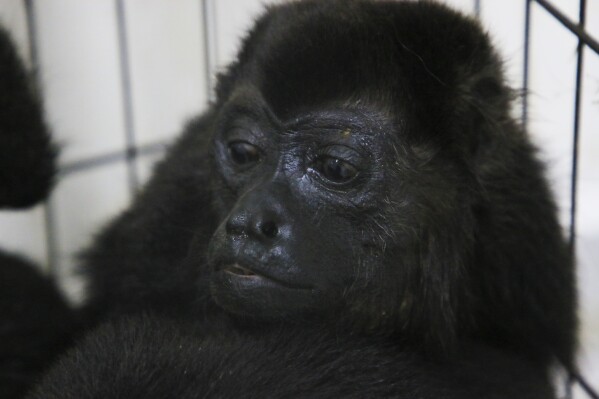Comalcalco (Mexico) (AFP) – Volunteers are rushing to hoist food and water up into trees in sweltering southern Mexico, but help came too late for the howler monkeys whose lifeless bodies lay still on the ground.
Issued on: 22/05/2024

A sick howler monkey recovers at a clinic in southern Mexico after being taken there by residents
© Yuri CORTEZ / AFP
Dozens of the primates are reported to have dropped dead from trees in recent weeks, alarming conservationists trying to keep the monkeys hydrated during a heat wave.
Victor Morato and his team at a veterinary hospital in the town of Comalcalco in Tabasco state have treated eight howler monkeys brought in by residents.
"When they arrived here in agony, they extended their hand to us as if to say 'help me'. I had a lump in my throat," he told AFP.
Several monkeys arrived at the clinic with body temperatures of around 43 degrees Celsius (109 degrees Fahrenheit), Morato said.

Dozens of the primates are reported to have dropped dead from trees in recent weeks, alarming conservationists trying to keep the monkeys hydrated during a heat wave.
Victor Morato and his team at a veterinary hospital in the town of Comalcalco in Tabasco state have treated eight howler monkeys brought in by residents.
"When they arrived here in agony, they extended their hand to us as if to say 'help me'. I had a lump in my throat," he told AFP.
Several monkeys arrived at the clinic with body temperatures of around 43 degrees Celsius (109 degrees Fahrenheit), Morato said.

A DEAD howler monkey's body is seen covered in lime in southern Mexico
© Yuri CORTEZ / AFP
When they faint from the heat they sometimes fall 20 meters (65 feet), he added.
It is all the more worrying since the Mexican howler (Alouatta palliata mexicana) and the Yucatan black howler (Alouatta pigra) are considered endangered by the International Union for Conservation of Nature.
The mantled howler (Alouatta palliata), which also lives in southern Mexico as well as Central and South America, is classified as vulnerable on the Red List of Threatened Species.
When they faint from the heat they sometimes fall 20 meters (65 feet), he added.
It is all the more worrying since the Mexican howler (Alouatta palliata mexicana) and the Yucatan black howler (Alouatta pigra) are considered endangered by the International Union for Conservation of Nature.
The mantled howler (Alouatta palliata), which also lives in southern Mexico as well as Central and South America, is classified as vulnerable on the Red List of Threatened Species.
Authorities investigate
Leonardo Sanchez was among those putting out water and fruit to help the animals on a cocoa plantation in the southern state of Tabasco.

Food and water are hoisted up into a tree by volunteers for howler monkeys in Mexico
© Yuri CORTEZ / AFP
The thermometer has reached almost 50 degrees Celsius (113 degrees Fahrenheit) in recent weeks, the 22-year-old biology student said.
"We've had a large number of deaths (of monkeys) due to the increased temperatures," he said.
Some volunteers carried lime to sprinkle on the bodies of dead primates.
President Andres Manuel Lopez Obrador, who hails from Tabasco, said Monday the heat was the worst he had known.
"Since I've been visiting these states I've never felt it as much as I do now," he said at his regular news conference.
Mexico's environment ministry has said that it is investigating whether extreme heat was killing the monkeys, with studies under way to rule out a virus or disease.
The thermometer has reached almost 50 degrees Celsius (113 degrees Fahrenheit) in recent weeks, the 22-year-old biology student said.
"We've had a large number of deaths (of monkeys) due to the increased temperatures," he said.
Some volunteers carried lime to sprinkle on the bodies of dead primates.
President Andres Manuel Lopez Obrador, who hails from Tabasco, said Monday the heat was the worst he had known.
"Since I've been visiting these states I've never felt it as much as I do now," he said at his regular news conference.
Mexico's environment ministry has said that it is investigating whether extreme heat was killing the monkeys, with studies under way to rule out a virus or disease.

A wild howler monkey is seen in a tree in Mexico's Tabasco State
© Yuri CORTEZ / AFP
Causes under consideration included heat stroke, dehydration, malnutrition or fumigation of crops with pesticides, it said.
In Tabasco, a vulture lingered and flies swarmed near a grave that volunteer Bersabeth Ricardez said contained the bodies of around 30 monkeys.
"Today it's the monkeys. Tomorrow it will be us," she said.
© 2024 AFP
Causes under consideration included heat stroke, dehydration, malnutrition or fumigation of crops with pesticides, it said.
In Tabasco, a vulture lingered and flies swarmed near a grave that volunteer Bersabeth Ricardez said contained the bodies of around 30 monkeys.
"Today it's the monkeys. Tomorrow it will be us," she said.
© 2024 AFP
It’s so hot in Mexico that howler monkeys are falling dead from the trees

A veterinarian feeds a young howler monkey rescued amid extremely high temperatures in Tecolutilla, Tabasco state, Mexico, Tuesday, May 21, 2024. Dozens of howler monkeys were found dead in the Gulf coast state while others were rescued by residents who rushed them to a local veterinarian. (AP Photo/Luis Sanchez)
BY MARK STEVENSON
May 21, 2024
MEXICO CITY (AP) — It’s so hot in Mexico that howler monkeys are falling dead from the trees.
At least 138 of the midsize primates, who are known for their roaring vocal calls, were found dead in the Gulf Coast state of Tabasco since May 16, according to the Biodiversity Conservation of The Usumacinta group. Others were rescued by residents, including five that were rushed to a local veterinarian who battled to save them.
“They arrived in critical condition, with dehydration and fever,” said Dr. Sergio Valenzuela. “They were as limp as rags. It was heatstroke.”
While Mexico’s brutal heat wave has been linked to the deaths of at least 26 people since March, veterinarians and rescuers say it has killed dozens and perhaps hundreds of howler monkeys. Around a third of the country saw highs of 45 degrees Celsius (113 degrees Fahrenheit) on Tuesday.
In the town of Tecolutilla, Tabasco, the dead monkeys started appearing Friday, when a local volunteer fire-and-rescue squad showed up with five of the creatures in the bed of a truck.

Howler monkeys sit in a cage at a veterinarian clinic after they were rescued amid extremely high temperatures in Tecolutilla, Tabasco state, Mexico, Tuesday, May 21, 2024. (AP Photo/Luis Sanchez)
Normally quite intimidating, howler monkeys are muscular and some can be as tall as 90 centimeters (3 feet), with tails just as long. Some males weigh more than 13.5 kilograms (30 pounds) and can live up to 20 years. They are equipped with big jaws and a fearsome set of teeth and fangs. But mostly they’re know for their lion-like roars, which bely their size.
“They (the volunteers) asked for help, they asked if I could examine some of the animals they had in their truck,” Valenzuela said Monday. “They said they didn’t have any money, and asked if I could do it for free.”
The veterinarian put ice on their limp little hands and feet, and hooked them up to IV drips with electrolytes.
So far, the monkeys appear to be on the mend. Once listless and easily handled, they are now in cages at Valenzuela’s office. “They’re recovering. They’re aggressive … they’re biting again,” he said, noting that’s a healthy sign for the usually furtive creatures.
Most aren’t so lucky. Wildlife biologist Gilberto Pozo counted about 138 of the animals dead or dying on the ground under trees. The die-off started around May 5 and hit its peak over the weekend.
“They were falling out of the trees like apples,” Pozo said. “They were in a state of severe dehydration, and they died within a matter of minutes.” Already weakened, Pozo says, the falls from dozens of yards (meters) up inflict additional damage that often finishes the monkeys off.
Pozo attributes the deaths to a “synergy” of factors, including high heat, drought, forest fires and logging that deprives the monkeys of water, shade and the fruit they eat, while noting that a pathogen, disease or other factor can’t yet be ruled out.
For people in the steamy, swampy, jungle-covered state of Tabasco, the howler monkey is a cherished, emblematic species; local people say the monkeys tell them the time of day by howling at dawn and dusk.
Pozo said the local people — who he knows through his work with the Biodiversity Conservation of The Usumacinta group — have tried to help the monkeys they see around their farms. But he notes that could be a double-edged sword.
“They were falling out of the trees, and the people were moved, and they went to help the animals, they set out water and fruit for them,” Pozo said. “They want to care for them, mainly the baby monkeys, adopt them.”
“But no, the truth is that babies are very delicate, they can’t be in a house where there are dogs or cats, because they have pathogens that can potentially be fatal for howler monkeys,” he said, stressing they must be rehabilitated and released into the wild.
Pozo’s group has set up a special recovery stations for monkeys — it currently holds five monkeys, but birds and reptiles have also been affected — and is trying to organize a team of specialized veterinarians to give the primates the care they need.
Belatedly, the federal government acknowledged the problem Monday, with President Andrés Manuel López Obrador saying he had heard about it on social media. He congratulated Valenzuela on his efforts and said the government would seek to support the work.

A soldier removes the body of a howler monkey that died amid extremely high temperatures in Tecolutilla, Tabasco state, Mexico, May 21, 2024. (AP Photo/Luis Sanchez)
López Obrador acknowledged the heat problem — “I have never felt it as bad as this” — but he has a lot of human problems to deal with as well.
By May 9, at least nine cities in Mexico had set temperature records, with Ciudad Victoria in the border state of Tamaulipas clocking a broiling 47 C (117 F).
With below-average rainfall throughout almost all the country so far this year, lakes and dams are drying up, and water supplies are running out. Authorities have had to truck in water for everything from hospitals to fire-fighting teams. Low levels at hydroelectric dams have contributed to power blackouts in some parts of the country.
Consumers are feeling the heat as well. On Monday, the nationwide chain of OXXO convenience stores — the nation’s largest — said it was limiting purchases of ice to just two or three bags per customer in some places.
“In a period of high temperatures, OXXO is taking measures to ensure supplies of products for our customers,” parent company FEMSA said in a statement. “Limits on the sale of bagged ice seek to ensure that a larger number of customers can buy this product.”
But for the monkeys, it’s not a question of comfort, but of life or death.
“This is a sentinel species,” Pozo said, referring to the canary-in-a-coal-mine effect where one species can say a lot about an ecosystem. “It is telling us something about what is happening with climate change.”

A howler monkey sits inside a cage with others at a veterinarian clinic after they were rescued amid extremely high temperatures in Tecolutilla, Tabasco state, Mexico, Tuesday, May 21, 2024. (AP Photo/Luis Sanchez)
___
Follow AP’s coverage of Latin America and the Caribbean at https://apnews.com/hub/latin-america
A veterinarian feeds a young howler monkey rescued amid extremely high temperatures in Tecolutilla, Tabasco state, Mexico, Tuesday, May 21, 2024. Dozens of howler monkeys were found dead in the Gulf coast state while others were rescued by residents who rushed them to a local veterinarian. (AP Photo/Luis Sanchez)
BY MARK STEVENSON
May 21, 2024
MEXICO CITY (AP) — It’s so hot in Mexico that howler monkeys are falling dead from the trees.
At least 138 of the midsize primates, who are known for their roaring vocal calls, were found dead in the Gulf Coast state of Tabasco since May 16, according to the Biodiversity Conservation of The Usumacinta group. Others were rescued by residents, including five that were rushed to a local veterinarian who battled to save them.
“They arrived in critical condition, with dehydration and fever,” said Dr. Sergio Valenzuela. “They were as limp as rags. It was heatstroke.”
While Mexico’s brutal heat wave has been linked to the deaths of at least 26 people since March, veterinarians and rescuers say it has killed dozens and perhaps hundreds of howler monkeys. Around a third of the country saw highs of 45 degrees Celsius (113 degrees Fahrenheit) on Tuesday.
In the town of Tecolutilla, Tabasco, the dead monkeys started appearing Friday, when a local volunteer fire-and-rescue squad showed up with five of the creatures in the bed of a truck.
Howler monkeys sit in a cage at a veterinarian clinic after they were rescued amid extremely high temperatures in Tecolutilla, Tabasco state, Mexico, Tuesday, May 21, 2024. (AP Photo/Luis Sanchez)
Normally quite intimidating, howler monkeys are muscular and some can be as tall as 90 centimeters (3 feet), with tails just as long. Some males weigh more than 13.5 kilograms (30 pounds) and can live up to 20 years. They are equipped with big jaws and a fearsome set of teeth and fangs. But mostly they’re know for their lion-like roars, which bely their size.
“They (the volunteers) asked for help, they asked if I could examine some of the animals they had in their truck,” Valenzuela said Monday. “They said they didn’t have any money, and asked if I could do it for free.”
The veterinarian put ice on their limp little hands and feet, and hooked them up to IV drips with electrolytes.
So far, the monkeys appear to be on the mend. Once listless and easily handled, they are now in cages at Valenzuela’s office. “They’re recovering. They’re aggressive … they’re biting again,” he said, noting that’s a healthy sign for the usually furtive creatures.
Most aren’t so lucky. Wildlife biologist Gilberto Pozo counted about 138 of the animals dead or dying on the ground under trees. The die-off started around May 5 and hit its peak over the weekend.
“They were falling out of the trees like apples,” Pozo said. “They were in a state of severe dehydration, and they died within a matter of minutes.” Already weakened, Pozo says, the falls from dozens of yards (meters) up inflict additional damage that often finishes the monkeys off.
Pozo attributes the deaths to a “synergy” of factors, including high heat, drought, forest fires and logging that deprives the monkeys of water, shade and the fruit they eat, while noting that a pathogen, disease or other factor can’t yet be ruled out.
For people in the steamy, swampy, jungle-covered state of Tabasco, the howler monkey is a cherished, emblematic species; local people say the monkeys tell them the time of day by howling at dawn and dusk.
Pozo said the local people — who he knows through his work with the Biodiversity Conservation of The Usumacinta group — have tried to help the monkeys they see around their farms. But he notes that could be a double-edged sword.
“They were falling out of the trees, and the people were moved, and they went to help the animals, they set out water and fruit for them,” Pozo said. “They want to care for them, mainly the baby monkeys, adopt them.”
“But no, the truth is that babies are very delicate, they can’t be in a house where there are dogs or cats, because they have pathogens that can potentially be fatal for howler monkeys,” he said, stressing they must be rehabilitated and released into the wild.
Pozo’s group has set up a special recovery stations for monkeys — it currently holds five monkeys, but birds and reptiles have also been affected — and is trying to organize a team of specialized veterinarians to give the primates the care they need.
Belatedly, the federal government acknowledged the problem Monday, with President Andrés Manuel López Obrador saying he had heard about it on social media. He congratulated Valenzuela on his efforts and said the government would seek to support the work.
A soldier removes the body of a howler monkey that died amid extremely high temperatures in Tecolutilla, Tabasco state, Mexico, May 21, 2024. (AP Photo/Luis Sanchez)
López Obrador acknowledged the heat problem — “I have never felt it as bad as this” — but he has a lot of human problems to deal with as well.
By May 9, at least nine cities in Mexico had set temperature records, with Ciudad Victoria in the border state of Tamaulipas clocking a broiling 47 C (117 F).
With below-average rainfall throughout almost all the country so far this year, lakes and dams are drying up, and water supplies are running out. Authorities have had to truck in water for everything from hospitals to fire-fighting teams. Low levels at hydroelectric dams have contributed to power blackouts in some parts of the country.
Consumers are feeling the heat as well. On Monday, the nationwide chain of OXXO convenience stores — the nation’s largest — said it was limiting purchases of ice to just two or three bags per customer in some places.
“In a period of high temperatures, OXXO is taking measures to ensure supplies of products for our customers,” parent company FEMSA said in a statement. “Limits on the sale of bagged ice seek to ensure that a larger number of customers can buy this product.”
But for the monkeys, it’s not a question of comfort, but of life or death.
“This is a sentinel species,” Pozo said, referring to the canary-in-a-coal-mine effect where one species can say a lot about an ecosystem. “It is telling us something about what is happening with climate change.”
A howler monkey sits inside a cage with others at a veterinarian clinic after they were rescued amid extremely high temperatures in Tecolutilla, Tabasco state, Mexico, Tuesday, May 21, 2024. (AP Photo/Luis Sanchez)
___
Follow AP’s coverage of Latin America and the Caribbean at https://apnews.com/hub/latin-america
No comments:
Post a Comment